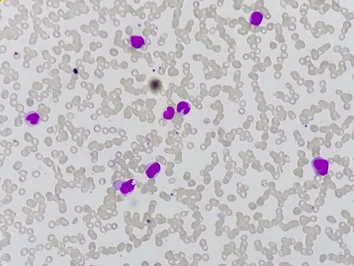


Clinical Research
Novel Method for Acute Myeloid Leukemia Management
Novel Method for Acute Myeloid Leukemia Management
Acute myeloid leukemia (AML) is the most common type of leukemia in adults with growing mortality and morbidity. It’s a rapidly progressing disease; hence the name “acute.” As a heterogeneous disease, AML is characterized by a range of genomic alterations and molecular mutations that influence clinical outcomes, which include epigenetic aberrations arising during early cancer development.
The exact cause of AML is unknown.


Zejuan Li, MD, PhD, FACMG
An important biomarker in AML is measurable residual disease (MRD), which refers to the low levels of leukemia not detected by morphologic assessments. MRD detection is important in patient management, risk assessment and therapeutic decision-making and is significant since AML relapse occurs in more than 50% of patients within two to three years of initial therapy. Currently, multiparameter flow cytometry (MFC) and molecular methods are used for MRD detection. Both have shortcomings and cannot detect MRD in many AML patients.
Zejuan Li, MD, PhD, FACMG, Associate Professor of Pathology and Genomic Medicine, understood that it is imperative to establish markers that can accurately detect MRD in AML patients. Li and her team developed a highly sensitive 5-hydroxymethylcytosine (5hmC) signature in cell-free DNA (cfDNA) for MRD detection, which is superior to current methods and significantly associated with relapse-free survival. This method could change the future of AML management.
Li’s team developed this method by analyzing 115 AML patients and 86 non-cancer individuals. The details of this study are published in the peer-reviewed journal Clinical Epigenetics. The 5hmC signature in cfDNA—essentially DNA modifications—is highly sensitive for the detection and prognosis of several cancers including AML.
“5hmC is an emerging and valuable DNA marker for cancer,”- noted Li.
The cfDNA 5hmC signature offers several advantages over the current MRD detection methods:
- allows for more frequent and real-time monitoring of AML patients since painful bone marrow biopsy procedures can be bypassed
- sensitivity is likely to be higher than MFC and molecular methods
- applies to almost all AML patients
- usage does not require knowledge of the prior epigenetic status of AML patients
- can be used independently of germline mutations or clonal hematopoiesis, which affects the accuracy of other methods
- cost effective
We developed a highly sensitive blood marker for MRD assessment in AML. The cfDNA 5hmC method can detect MRD in patients who test MRD negative by MFC and molecular methods. Because 5hmC changes dynamically in almost all AML patients, the new method has the potential to reflect real-time disease status in most AML patients. Establishing new markers that accurately detect MRD will improve clinical management of AML patients and may dramatically improve clinical outcomes.
Zejuan Li, MD, PhD, FACMG
Associate Professor, Pathology and Genomic Medicine
Furthermore, the 5hmC signature detected MRD in AML patients who were assessed as MRD-negative by MFC and molecular methods. Additionally, this signature can improve MRD detection in AML patients—a critical component of improved overall survival— and complement the current methods of MRD detection.
“We developed a highly sensitive blood marker for MRD assessment in AML. The cfDNA 5hmC method can detect MRD in patients who test MRD negative by MFC and molecular methods,” said Li. “5hmC changes dynamically in almost all AML patients. Hence, the new method has the potential to reflect real-time disease status in most AML patients. Establishing new markers that accurately detect MRD will improve clinical management of AML patients and may dramatically improve clinical outcomes.”
Li continued, “The data described in this study will provide a solid foundation for future clinical studies. The cfDNA 5hmC method provides a safe, easy and minimally invasive approach for MRD detection and underscores the potential of investigatory epigenetics using cfDNA in leukemia and other hematological malignancies.”
Jianming Shao, Shilpan Shah, Siddhartha Ganguly, Youli Zu, Chuan He, Zejuan Li. Cell-free DNA 5-hydroxymethylcytosine is highly sensitive for MRD assessment in acute myeloid leukemia. Clin Epigenetics. 2023 Aug 24;15(1):134. doi: 10.1186/s13148-023-01547-0.
This work was supported by an American Cancer Society Research Scholar Grant RSG-17-044-01-LIB (Z.L.).
Share this story
Abanti Chattopadhyay, PhD
August 2025
Related Articles




